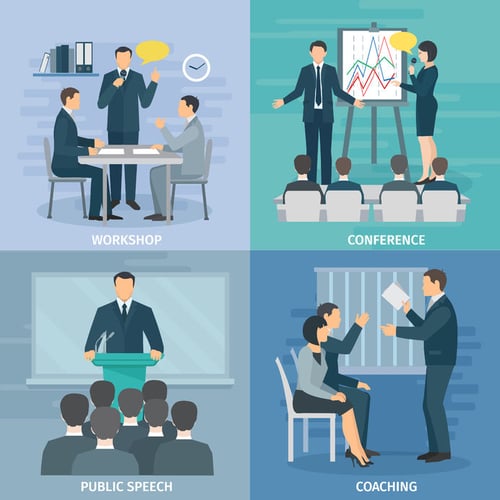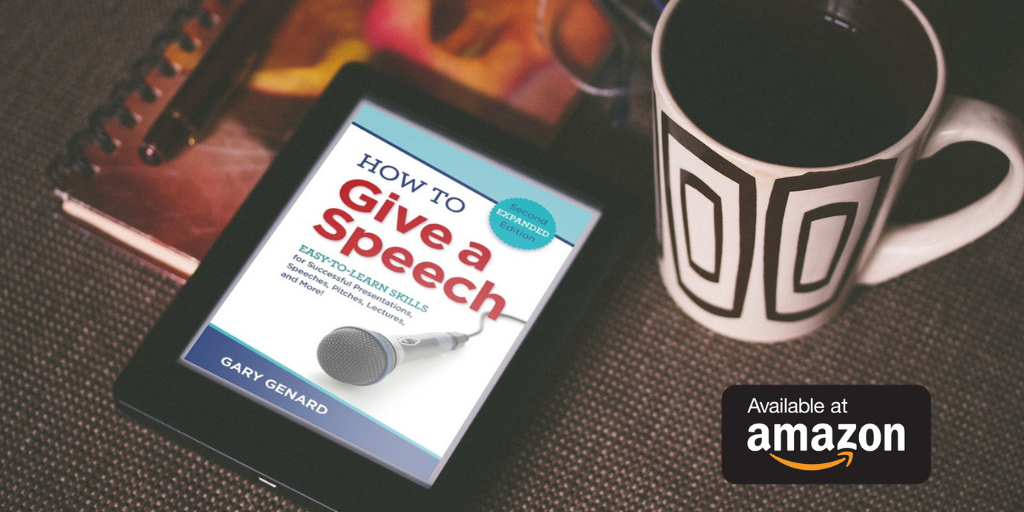 Do you know the most powerful ways to move an audience? Here's how to practice a speech for the best results.
Do you know the most powerful ways to move an audience? Here's how to practice a speech for the best results.
Did you know that when it comes to an important speech or presentation, you already have content coming out of your ears? That's a metaphor I use often when helping people understand how they can be an effective—and perhaps even memorable—speaker.
It's usually necessary to take this approach because of the way most people prepare to speak. Paradoxically, they do so by spending all their time writing.
Speaking vs. Writing: That's what I'm really talking about when I discuss how they should prepare and rehearse an upcoming talk.
In other words, I'm sharing with them how to practice a speech for the best results.
For your message to resonate with listeners, your speech needs some essential elements. Find out what they are in my free downloadable presenter's guide, "7 Key Components of Successful Presentations."
As you've probably guessed by know, the formula for great speaking doesn't reside wholly in your material, i.e., the content. To direct all of your focus there is, truly, to misapprehend how you should be spending your time and efforts in the run-up to your appearance. So let's get on the right wavelength to understand how best to proceed when it comes to connecting with and moving audiences.

How You Can Have the Most Impact On Stage
To make something extraordinary happen in the room (or auditorium) where you're speaking, begin at the right place: with your audience and the speaking situation. And I mean literally that you should start with speaking rather than writing.
Think about how most of us usually prepare to speak. Doesn't it involve taking notes, then editing and polishing that written material—whether it's handwriting on yellow legal pads or bulleted items in PowerPoint? In other words, we swim happily in the ocean of literary efforts that we're so comfortable with because we've been educated and trained that way. But then, of course, we have to emerge onto the dry land, if you will, where we'll be giving our presentation. (If you're thinking that I'm using these allusions to show how we need to evolve in our thinking, you're getting my point.)
At that point, we're in the oral arena of public speaking—the most powerful venue for influencing listeners. But all we have at our side is, basically, a literary document: the polished notes or manuscript we've worked on so hard to help us speak with eloquence.

Start Speaking (and Listening) as Early as Possible
The problem at this point—and it's a fundamental mistake we've led ourselves to—is that we probably don't sound the way we want to come across. That's because writing and speaking are two distinctly different forms of communication. They differ in their rhythms, use of language, length of utterance, necessary tone, and of particular importance, what can be absorbed in real time by the reader versus the auditor.
To boil all of this down: you can't judge how anything will sound until you hear it yourself. Try this simple experiment to hear what I mean: Choose a passage from today's newspaper, novel, or nonfiction: the form doesn't matter. Read the selection silently, "listening" in your head to the words you emphasize. Now read the same passage out loud. You should be slightly surprised at how different words need to be emphasized for the meaning to come across when you're speaking versus reading.
The implication is clear and profound concerning how to get a speech up and running: Once you know you'll be performing this material in public, you should start with speaking rather than writing. Marshall your ideas the same way you normally would, and use one of the four classic formats for organizing a speech if that's helpful. Then start trying different ways of speaking your ideas concerning phrasing, metaphors, imagery, length of sentences, etc., always keeping in mind how best to reach this audience.
When something sounds the way you want it to concerning your audience's probable response (intellectually and emotionally), then write it down. By the time you finish this process, you'll have a speech that will almost without any doubt succeed in the oral arena. And you'll save yourself rewriting time you'd otherwise need to make a literary document into an oral presentation.
 Are You Warming Up for the Big Game?
Are You Warming Up for the Big Game?
Now it's time to rehearse. Don't make the enormous mistake of spending all your available time throwing together content and not getting up on your feet. This is part of the mindset that tells you that the information you'll deliver is all-important, and your platform skills and comfort up there don't matter.
The reality is, those factors are at least as important as your content. This is the oral arena, remember? The audience isn't here to absorb information in the absence of a speaker. A speaker is the reason they're here. So your ability to be comfortable, make eye contact, establish rapport, and most of all, to give a physical dimension to what you're saying through body language, is actually the essence of the public speaking situation. It's about you much more than you think.
And here with clients I use a sports metaphor: If you were a pole vaulter or a soccer player, would you only think about the upcoming event? Or would you stretch, do your breathing and focus exercises, and otherwise get ready to perform? Likewise, getting up on your feet to move and to embody your speech should be your approach to your own big game.
You should follow me on Twitter here.



